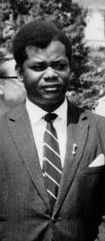Related Research Articles

Dar es Salaam is the largest city and former capital of Tanzania. With over six million people, it is the largest city in East Africa and the fifth-largest in Africa. On the Swahili coast, Dar es Salaam is an important economic centre and one of the fastest-growing cities in the world.
The African Great Lakes nation of Tanzania dates formally from 1964, when it was formed out of the union of the much larger mainland territory of Tanganyika and the coastal archipelago of Zanzibar. The former was a colony and part of German East Africa from the 1880s to 1919’s when, under the League of Nations, it became a British mandate. It served as a British military outpost during World War II, providing financial help, munitions, and soldiers. In 1947, Tanganyika became a United Nations Trust Territory under British administration, a status it kept until its independence in 1961. The island of Zanzibar thrived as a trading hub, successively controlled by the Portuguese, the Sultanate of Oman, and then as a British protectorate by the end of the nineteenth century.

Julius Kambarage Nyerere was a Tanzanian anti-colonial activist, politician, and political theorist. He governed Tanganyika as Prime Minister from 1961 to 1962 and then as President from 1963 to 1964, after which he led its successor state, Tanzania, as President from 1964 to 1985. A founding member of the Tanganyika African National Union (TANU) party—which in 1977 became the Chama Cha Mapinduzi party—he chaired it until 1990. Ideologically an African nationalist and African socialist, he promoted a political philosophy known as Ujamaa.

Abeid Amani Karume was the first President of Zanzibar. He obtained this title as a result of a revolution which led to the deposing of His Majesty Sir Jamshid bin Abdullah, the last reigning Sultan of Zanzibar, in January 1964. Three months later, the United Republic of Tanzania was founded, and Karume became the first Vice President of the United Republic with Julius Nyerere of Tanganyika as president of the new country. He was the father of Zanzibar's former president, Amani Abeid Karume.

Kanyama Chiume, born Murray William Kanyama Chiume, was a leading nationalist in the struggle for Malawi's independence in the 1950s and 1960s. He was also one of the leaders of the Nyasaland African Congress and served as the Minister of Education and the Minister for Foreign Affairs in the 1960s before fleeing the country after the 1964 Cabinet Crisis.

Uhuru Stadium is adjacent to the National Stadium in Dar es Salaam, Tanzania.
Godfrey Mwakikagile is a prominent Tanzanian scholar and author specialising in African studies. He was also a news reporter for the Standard — the oldest and largest English newspaper in Tanzania and one of the three largest in East Africa.

Oscar Salathiel Kambona (1925-1997) was the first Minister of Foreign Affairs of Tanganyika. He was the second-most influential and most popular leader in the country after President Julius Nyerere.
Dani Wadada Nabudere was an accomplished Ugandan academic, Pan-Africanist, lawyer, politician, author, political scientist, and development specialist. At the time of his passing, he was a professor at the Islamic University and executive director of the Marcus Garvey Pan-Afrikan Institute, Mbale, Uganda.
This is a timeline of Tanzanian history, comprising important legal and territorial changes and political events in Tanzania and its predecessor states. To read about the background to these events, see History of Tanzania. See also the list of Presidents of Tanzania.
The Tanganyika African Association (TAA) was a Tanganyika Territory political association, formed in 1929. It was founded by civil servants including Ali Saidi, members of an earlier association called the Tanganyika Territory African Civil Service association. After WWII, TAA expanded countrywide in towns and in rural areas, in 1948, the number of branches had increased to 39. of an earlier association called the Tanganyika Territory African Civil Service association. It was transformed into the Tanganyika African National Union (TANU) in 1954 by Julius Nyerere.
Sir Richard Gordon Turnbull, GCMG was a British colonial governor and the last governor of the British mandate of Tanganyika from 1958 to 1961. Following the country's independence, he was governor-general from 9 December 1961 to 9 December 1962.
Pakistanism, or Pakistanisation, is a neologism that refers to the continual division of any society along religious lines.

Amir Habib Jamal was a Tanzanian politician and diplomat who served as a Minister under various portfolios in the Julius Nyerere administration. He represented the parliamentary constituency of Morogoro from 1960 to 1985, and was Tanzania's longest-serving Finance Minister and led the ministry for about 12 years.
John Mwakangale was one of the main leaders in the struggle for independence in Tanganyika during British colonial rule. When the country gained independence, Mwakangale joined the first cabinet of Julius Nyerere, the first President of Tanzania as Minister of Labour. Mwakangale is also regarded as a Pan-Africanist and a staunch African nationalist. He was also the first leader whom Nelson Mandela met in 1962 when he escaped from prison seeking assistance from other African leaders. Mandela gave a detail account about that encounter in his book Long Walk to Freedom.
Jeremiah Kasambala was one of the first ministers in the cabinet of Julius Nyerere after Tanganyika won independence from Britain on 9 December 1961. He rose to prominence when he was the head of the Rungwe African Cooperative Union in Rungwe District in the Southern Highlands Province.
Kenneth Marin was an American professor of economics who worked under President Lyndon B. Johnson. President Johnson appointed Marin as a member of the White House Consumer Advisory Council where he served on Wage and Price Control during the mid-sixties.1
The Pan-African Freedom Movement of East and Central Africa (PAFMECA), later renamed to the Pan-African Freedom Movement of East, Central and Southern Africa (PAFMECSA) was a political and Pan-Africanist organisation that was formed to campaign for the independence of the countries of East and Central Africa from colonial and white minority rule. The organisation was formed at a conference held in Mwanza, Tanganyika, from 16 to 18 September 1958. Julius Nyerere and Tom Mboya the Kenyan Pan-Africanist and trade unionist were among the founders.
Austin Shaba was one of the leaders of Tanganyika, later Tanzania, from the time the country won independence from Britain on 9 December 1961.
References
1. Godfrey Mwakikagile, Nyerere and Africa: End of an Era, New Africa Press, Fifth Edition, Pretoria, South Africa, 2010, pp. 94, 105, 112, 119, 329 – 330, 492; John Illife, A Modern History of Tanganyika, Cambridge University Press, Cambridge, UK, 1979, pp. 560, 565; Ronald Aminzade, Race, Nation, and Citizenship in Post-Colonial Africa: The Case of Tanzania, New York, Cambridge University Press, 2013, p. 116; Michael Longford, The Flags Changed at Midnight: Towards the Independence of Tanganyika, Gracwing, Leominster, Herefordshire, UK., 2001, p. 48; Godfrey Mwakikagile, Tanzania under Mwalimu Nyerere: Reflections on an African Statesman, New Africa Press, Pretoria, South Africa, 2006, p. 17; Godfrey Mwakikagile, Life in Tanganyika in The Fifties, Third Edition, New Africa Press, Dar es Salaam, Tanzania, 2010, p. 149; M. W. Kanyama Chiume, Kwacha: An Autobiography, East African Publishing House, Nairobi, Kenya, 1975, p. 92; M.W.K. Chiume, Autobiography of Kanyama Chiume, Panaf, London, 1982, p. 100; Jeni Klugman, Bilini Neyapti, and Frances Stewart, Conflict and Growth in Africa, Vol. 2: Kenya, Tanzania and Uganda, Development Centre Studies, OECD, Paris, France, 1999, p. 79; Francis Fanuel Lyimo, Rural Cooperation in the Cooperative in Tanzania, Mkuki na Nyota Publishers, Dar es Salaam, Tanzania, 2012, p. 37; Tanganyika News Review, Volumes 1 – 15, Tanganyika Information Services, Dar es Salaam, Tanganyika, 1961, p. 14; Africa Report, 1965, p. 30; EAPH Political Studies, Volume 3, East African Publishing House, Nairobi, Kenya, 1967, pp. 128, 227.
2. Godfrey Mwakikagile: Eurocentric Africanist? https://sites.google.com/site/intercontinentalbookcentre/godfrey-mwakikagile-a-eurocentric-pan-africanist